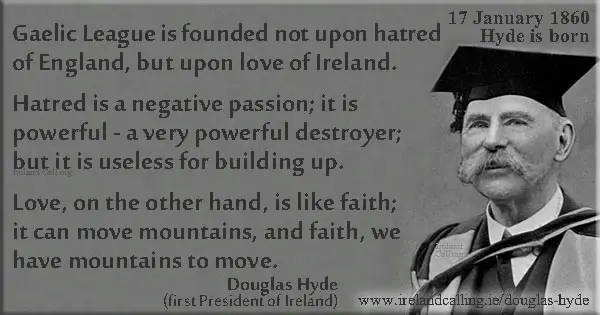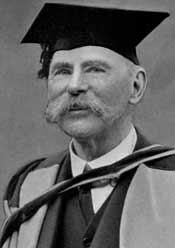Douglas Hyde, Ireland’s first President, was a Protestant but he was not doctrinaire and did not believe that one denomination was superior to another.
First President of Ireland
Douglas Hyde quotes
One of his main political aims was to create unity between Irish Protestants and Catholics. He felt they should be united by their nationality rather than divided by their religion.
In July, 1893 Hyde and his friend Eoin MacNeill founded the Gaelic League, one of the most important organisations in Irish history. Its aim was to promote Irish culture and to preserve the Irish language. It produced its own newspaper, An Claidheamh Soluis, the Sword of Light.

The Gaelic League helped to feed the wave of nationalist sentiment in Ireland at that time. It was responsible for persuading the government to declare St Patrick’s Day a public holiday. It set up an Irish language college and sent teachers throughout the country to promote the use of Irish.
Young people flocked to it and by the turn of the century, it had more than 500 branches across the country.
Sinn Feiners wanted the Gaelic League to be political
Hyde was president of the Gaelic League but became concerned at the way it was being pulled towards political rather than cultural objectives. Although he was a nationalist, he wanted the League to be independent of all political influences. This became increasingly difficult in the early years of the 20th century.

The Gaelic League had attracted idealistic young Irishmen like Patrick Pearse and Michael Collins. They wanted to promote Irish culture but they also had political ambitions to achieve Irish independence. There was growing tension which began to escalate from 1905 onwards after Sinn Fein was founded.
The Sinn Feiners wanted to make the Gaelic League more political. Hyde resisted but was fighting a losing battle. As the Home Rule campaign gathered pace, protestants in the north formed the Ulster Volunteers in 1913. This was a force prepared to fight against Home Rule for Ireland as the Ulster Protestants feared being overwhelmed in an independent Catholic state.
Nationalists in the south responded by forming the Irish Volunteers, a force prepared to fight for Irish freedom if necessary. The development put extra pressure on the Gaelic League. In 1915, its nationalist members were now numerous enough to change the League’s constitution, making it actively support an independent Ireland “free of foreign domination”.
Hyde resigned as president. Although he was a nationalist himself, he didn’t want the Gaelic League to be political. He was fully aware, however, of the political role the Gaelic League had performed. He wrote: “The Gaelic League grew up and became the spiritual father of Sinn Féin and Sinn Féin’s progeny were the Volunteers who forced the English to make the Treaty. The Dáil is the the child of the Volunteers, and thus it descends directly from the Gaelic League, whose traditions it inherits”.
Unanimous choice to become Ireland’s first president
Hyde continued to play an active part in Irish cultural life and later served as a senator.
In 1937, he was a unanimous choice by all the major parties in the Ireland to become the country’s first president. It was a role he was honoured to accept and he remained in office until 1945.
He died on 12 July 1949 and was given a state funeral. Throughout his life he had dreamed of creating an Ireland where differences of religious denomination didn’t matter. To a certain extent he succeeded and leading dignitaries from all religious persuasions attended his funeral. However, the religious divide still had a hand to play.
Catholic politicians had to wait outside during funeral
Hyde was Prostestant so a Church of Ireland service was held at St Patrick’s Cathedral in Dublin. However, Catholic canon law forbade Catholics attending services of other religions. It meant that leading Catholic politicians, including the President and cabinet members, had to wait outside during the service.
It was a sight that would have dismayed Hyde, who had no time for such intolerance.
Hyde is remembered as a major figure who perhaps more than anyone else, helped to revive Irish culture and language, and gave the Irish people the confidence to believe they had traditions and a way of life that were worth preserving.
His Gaelic League, although cultural rather than political, turned out to be a truly revolutionary organisation because it helped to revive the Irish identity and paved the nationalist and independence movements that were to follow.
Douglas Hyde – first President of Ireland
Founder of the Gaelic League
Douglas Hyde quotes
history.html